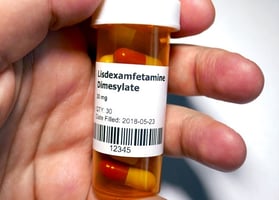Lisdexamphetamine May Help People With Amphetamine Use Disorder

Lisdexamphetamine may reduce hospitalization and death in people with amphetamine use disorder, a report in JAMA Psychiatry suggests. Lisdexamphetamine (brand name Vyvanse) is a stimulant approved to treat attention-deficit/hyperactivity disorder and binge eating disorder.
“Amphetamines are the second most used illicit drugs worldwide and amphetamine-related hospitalizations are increasing substantially,” wrote Milja Heikkinen, M.D., of the University of Eastern Finland and colleagues. Though deaths related to amphetamine or methamphetamine use have doubled over the past decade, there are no approved pharmacological interventions available for treating people with these disorders, they wrote.
Heikkinen and colleagues used national registers to identify all Swedish residents aged 16 to 64 who received a first diagnosis of a methamphetamine or amphetamine use disorder between July 2006 and December 2018. The study cohort included 13,965 people with methamphetamine or amphetamine use disorders (average age: 34 years) whose use of psychotropic medication as well as hospitalizations and/or death were tracked for an average of four years.
During the follow-up period, 74.0% of the cohort were hospitalized for a substance use disorder, 82.3% were hospitalized for any reason, and 9.5% died. The researchers found that individuals prescribed lisdexamphetamine had an 18% reduced risk of substance use hospitalization, 14% reduced risk of any hospitalization, and 57% reduced risk of death during periods when they were taking the medication compared with periods when they were not; it was the only medication that showed a benefit for all three of these outcomes. Methylphenidate, another stimulant, was also associated with decreased mortality risk but had no effect on hospitalizations.
In contrast, individuals with methamphetamine or amphetamine use disorders were at higher risk of any hospitalization during periods when they were taking benzodiazepines, antidepressants, or antipsychotics compared with periods when they were not taking these medications; benzodiazepine use was also associated with a higher risk of death.
Heikkinen and colleagues noted that the findings suggest that people with methamphetamine or amphetamine use disorder might benefit from replacement therapy to control stimulant intake—similar to how patients use nicotine patches to reduce smoking or buprenorphine to reduce opioid use.
To read more on this topic, see the Psychiatric News article “Naltrexone-Bupropion Combination May Reduce Methamphetamine Use.”
(Image: iStock/MJ_Prototype)
Don't miss out! To learn about newly posted articles in Psychiatric News, please sign up here.






